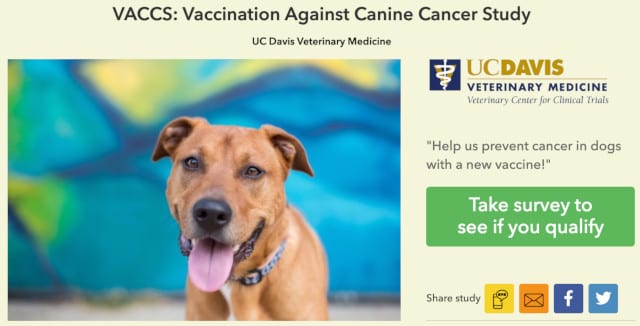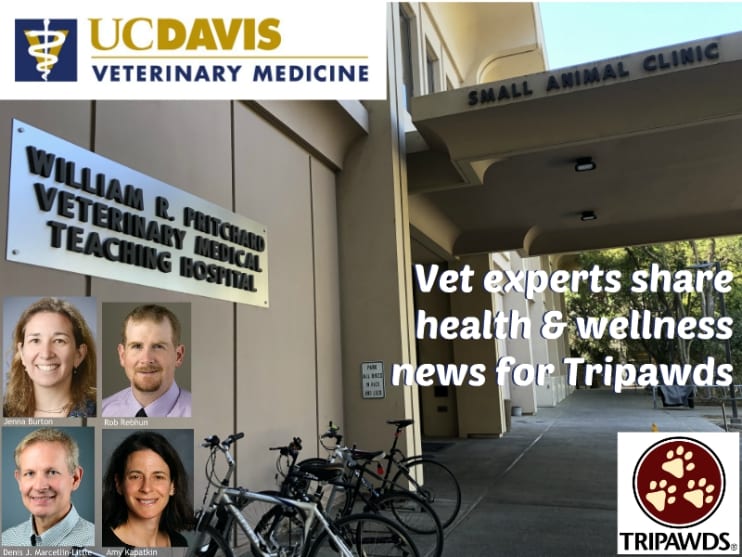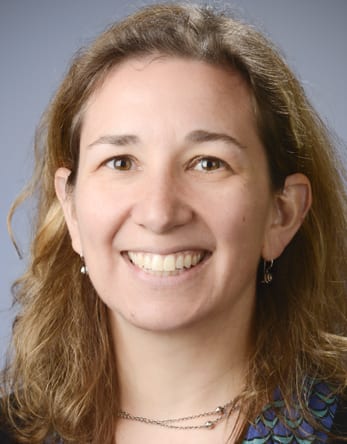Can you picture a day when a dog cancer vaccine is as routine as a rabies shot? We can, thanks to the Vaccine Against Canine Cancer (VACC) study happening at three veterinary schools in the U.S. All three sites are still actively enrolling and recruiting patients. Here’s what you need to know to get your dog in the study.

Keep reading to learn more about this important study and even how to enroll your dog in it, with Dr. Jenna Burton, DVM, MS, DACVIM (Oncology), Director of the Veterinary Center for Clinical Trials at UC Davis.
Tripawd Health Tips from UC Davis Vet Experts
In many ways, the Tripawds community exists because of the fine veterinarians at the University of California at Davis School of Veterinary Medicine. You see, our Chief Fun Officer, Jerry G. Dawg, was diagnosed with osteosarcoma and underwent amputation surgery at UC Davis in 2006. If it wasn’t for those pawesome vets who diagnosed his cancer when his hometown vets could not, well, we might not be here today!

In the next couple of months these UC Davis vet experts will share important Tripawd health topics you need to know about:
Jenna Burton, DVM, MS, DACVIM (Oncology), Director of the Veterinary Center for Clinical Trials, Associate Professor, Clinical Oncology discusses The Vaccine Against Canine Cancer Study.

Robert Rebhun, DVM, PhD, DACVIM (Oncology), Associate Director, Center for Companion Animal Health Cancer Program and Associate Professor, Surgical and Radiological Sciences talks about an IL-15 Immunotherapy Study to Stop Lung Metastasis in dogs with osteosarcoma.

Amy Kapatkin, DVM, MS, DACVS, Professor, Surgical & Radiological Sciences will share a fascinating procedure using Bone Morphogenetic Protein (BMP) for Limb Sparing.

Finally, Denis J. Marcellin-Little, DEDV, DACVS, DACVSMR, Chief of Service, Orthopedics shares tips to prevent Osteoarthritis in Three Legged Pets.

Watch this space for all of these fascinating conversations! Today, we’re kicking it off with Dr. Burton discussing the Vaccine Against Canine Cancer Study.
Get the Facts: The Vaccine Against Canine Cancer (VACC) Study
Our UC Davis vet series kicks off with Dr. Jenna Burton, Director of the Veterinary Center for Clinical Studies at UC Davis. And if you want even more details than we can squeeze into our short video, be sure to listen to the full-length VACC podcast interview, or read the entire transcript below.
If you live near UC Davis in California, find out more at Tri.pet/vacc-ucd.
Near Colorado State University, visit Tri.pet/vacc-csu.
And in Wisconsin, please check Tri.pet/vacc-uw.
Listen to the full interview on Tripawd Talk Radio, episode #87.
Full Transcript:
All About the Vaccine Against Canine Cancer Study
TRIPAWDS: Hello and thank you for listening to Tripawd Talk Radio, Episode #87. This is the third of our 4-part series sharing the complete unedited audio from interviews we held with faculty members at UC Davis School of Veterinary Medicine of October 3, 2019.
Watch all the video interviews from our visit on the Tripawds YouTube channel at YouTube.com/Tripawds and find all Tripawd Talk episodes and let us know what you think of these full audio podcasts at Tripawds.com/Radio.
Everyone would love to see a cancer vaccine. Well, the people behind the Vaccine Against Canine Cancer Study currently underway at three teaching hospitals around the US are working hard to make that a reality. Rene sat down with Dr. Jenna Burton who is leading the efforts at UC Davis. We will learn all about the VACC study, how it works, and what it takes to participate.
And now, let’s hear all about it from Dr. Jenna Burton, Director of the Veterinary Center for Clinical Trials at University of California Davis.
BURTON: I’m Jenna Burton and I’m a medical oncologist at the University of California Davis. I’m also the Director of the Veterinary Center for Clinical Trials here. And I research cancer treatments in pets with a goal of one day improving quality of life and survival for all species affected by cancer.
TRIPAWDS: So can you tell us about the vaccine study that you’re working on?
BURTON: Absolutely. The vaccine study, the VACC study which is Vaccination Against Canine Cancer Study is a really exciting project for us to be involved in. This is a study that is being conducted at three sites, UC Davis, Colorado, State, and University of Wisconsin. And we are evaluating a cancer preventative vaccine that has been developed by an investigator at Arizona State University. His name is Stephen Johnston.
And this study is really kind of the first of its kind to prevent a wide number of cancers that occur in dogs and potentially people as well.
TRIPAWDS: So what are the goals of the study?
BURTON: So this project which is funded by the Open Philanthropy Project is designed to see if we can reduce the incidents of cancer development in healthy dogs. And so, we are enrolling dogs that are ages 6 to 10 years old that have never been affected by cancer. So dogs that are really healthy and feel good and still living their best lives.
As part of the study, dogs will receive a series of vaccines initially given once every two weeks for four doses and then they will get a booster vaccine annually with some blood work visits about every six months.
The goal is to see if this is a randomized placebo controlled and blinded study so of the 800 dogs that are going to be enrolled in the study across all three sites, about half of them will receive the active vaccine and the other half will receive a sham vaccine or a placebo vaccine. And our goal is to see if we have a reduction in the occurrence of cancer in the dogs that get the active vaccine versus the dogs, the 400 dogs that received the sham vaccine.
It’s really the only way that you can test the scientific question appropriately. Sometimes the thought of receiving a placebo vaccine is a downside for people but I think without having that really important control arm, we don’t have a good sense of what the natural cancer occurrence would be in this patient population.
TRIPAWDS: And what is expected of the pet owner once their dog is accepted?
BURTON: So to qualify for the study, dogs need to have standard blood work, chest x-rays, and abdominal ultrasound to make sure that they don’t have any cancerous processes that might be hiding and haven’t manifested yet. And so, that’s part of the baseline screening. And those costs are actually paid for by the study.
If all those tests are really unremarkable, the owners are committing to bringing their dog in every two weeks for the first four vaccines and then every six months for the next five years.
We ask that owners follow up with their primary care veterinarians for all their routine preventative health needs, their heartworm medications, their flea and tick preventative, their core vaccines. And we ask them to follow up with their primary care veterinarians if they are to develop any health issues along the way and keep us informed of that.
It’s a big project and so we will be engaged with those primary care veterinarians to make sure that we are getting all the health information.
And additionally, owners need to be able to complete an online survey after each vaccination. This is really going to help us assess the potential side effects or problems that dogs may experience after these vaccines to make sure that not only that it works, that it decreases the incidents of cancer but it’s safe too.
TRIPAWDS: Are you targeting any or limiting any specific breed or size of the dogs that are typically prone to cancer or they are totally welcome?
BURTON: Another element of being included in the study is that it is restricted to breeds that have been shown to be more likely to develop cancer and that could be cancer across the board or it could be development of a specific cancer. So I think in that case, Scottish Terriers and they are really overrepresented in developing bladder cancer. Mixed breeds are one of the most common dogs that we see develop cancer so we absolutely are seeing those and a full list of the breeds can be found at a website that I can provide to you.
TRIPAWDS: Do the pet parents get screened out also? I mean do they have to be in a certain criteria?
BURTON: The only criteria that we have for the owner versus the pet is that they keep us informed of health issues that their dog maybe encountering, that they are willing to come to those appointments as scheduled, and then the big one is that they have to live within a 150 miles of the study site. So unfortunately, this excludes a large number of people that are really excited about this. But hopefully with time and these are other studies hopefully develop out of this project so there will be other opportunities for those enthusiastic pet owners.
TRIPAWDS: And how many dogs are enrolled right now?
BURTON: Across all three sites, there are over 100 dogs of the 800 dogs. So, enrollment just started earlier this summer. We are really excited. All three sites are still actively enrolling and recruiting patients. So if there are pet owners out there that are interested and live within 150 miles of UC Davis, Colorado State, or the University of Wisconsin, absolutely get in touch with that study site to see if they might be eligible to participate.
TRIPAWDS: Has the response been surprising to you? Have you gotten a lot of enthusiasm?
BURTON: We have gotten a lot of enthusiasm. It’s a sad fact of life that many of our pet owners have experienced cancer not only with their two-legged friends and family but also with their personal pets, those family members with four legs. And so, I would say most of the owners that have approached us about participating have had previous experiences with cancer in their pets and they are really motivated by this amazing altruism to try to help find a way to prevent cancer from affecting not only their own pets but other people’s animals.
Read our original Tripawds News blog pst about the VACC Study.TRIPAWDS: How long is the overall study and at what point started seeing any sort of changes?
BURTON: Yeah. So the study was anticipated to – we are going to follow these dogs for five years. If dogs develop cancer while they are on the study, the study does have a stipend to help those owners either do further workup and staging or treatment of that pet’s cancer. Once they developed cancer, the dogs are removed from the study but we will continue to likely follow up with those owners about how their pet is doing after the cancer treatment.
But if a dog remains healthy and does not develop cancer, it has the potential of remaining on the study for five years after it initially starts.
TRIPAWDS: Is cancer the only disease that would disqualify them
BURTON: Cancer is not the only disease that would disqualify them. Because we are looking at a vaccine and the immune system is really important for generating an appropriate response, the body’s natural response to be able to recognize early cancer cells in the future, we are including dogs that have a history of immune-mediated disease so dogs with – and dogs with Cushing’s or hypoadrenocorticism are also excluded because sometimes they can have an impaired immune system as well.
Other exclusions include body weight. Dogs have to be at least 10 kilograms. That’s a lie. Nope. Dogs have to be at least 5 kilograms and some of that is just due to the volume of blood that is collected at some of the study visits. And the ability to collect those blood samples is really important for us to assess the body’s immune response to the vaccine to make sure that it’s doing what we anticipate in the body.
Other exclusions would be a serious health problem that may prevent a dog from living another five years. And so things like advanced heart disease or advanced kidney disease, probably those dogs are not a good fit this study.
TRIPAWDS: What’s in the vaccine that are risks other than the typical side effects?
BURTON: This vaccine is targeting new proteins that are expressed on cancer cells and these are protein or neoantigens that are not normally seen on regular healthy cells but with some of the changes in the DNA that happen with cancer development. These new proteins are expressed on these cancer cells. And so this vaccine is allowing the immune system to target and attack these cancer cells at a much earlier stage of development, kind of priming the immune system.
Side effects with the vaccine, what we’ve seen to date and what we anticipate are going to be some of the common side effects that we may experience with vaccination. So some of the vaccinations are intramuscular so if you’ve ever had a flu shot you know that you may have some muscle soreness that may make it hard to raise your arm the next day. Usually, it’s pretty self-limiting. We may complain about it for 24 hour or so but normally it goes away uneventfully.
We are looking for changes at the vaccine site so redness or scabbing or swelling. I think probably the most serious side effect that we are on high alert for that we don’t expect to happen but I think we need to keep an open mind that it could happen is the development of autoimmune disease that we accidentally stimulate the body’s own immune system so then it begins to attack the body’s own normal cells.
I think that possibility is very small but we are informing all owners in the informed consent process that this is something that is not out of the realm of possibility.
TRIPAWDS: And when might we expect to hear updates on how things are going?
BURTON: So the study takes a long time. It’s prospective research. And so one of the things that unfortunately needs to happen for us to know whether this vaccine is working or not is that animals need to develop cancer or not. And so, we don’t know the timeline at which that will happen. There’s a planned interim analysis of the study to do that about halfway through the study timeframe. And if that’s encouraging, that will likely move forward other studies.
So we unfortunately may have to be patient for a bit of time before we start to get some early results.
TRIPAWDS: And if it’s determined that it has been successful in preventing cancer, could this somebody be available everywhere?
BURTON: I think that’s one – so one of the exciting things about this project is the opportunity to work with Dr. Johnston whose vision is to find strategies to prevent cancer that are cost-effective and widely available. And so, while we are looking in dogs right now, if this is successful then absolutely developing this into a cancer therapeutic vaccine that you would potentially get along with your core vaccines at your primary care veterinarian.
But there’s also excitement if it is promising in dogs then evaluating a similar vaccine in people as well would be a huge step to really benefit across species. And I don’t mean to leave out the cat owners for right now. But I think there are obviously other species that develop cancer that it would be amazing to investigate a cancer preventative vaccine for as well.
TRIPAWDS: Many thanks to Dr. Burton and everyone working so hard on this important study.
[End of transcript]

Thanks so much for bringing this to our attention! Fascinating!
Yeah, the length of time this study takes could be years. Of course, it’s sad that some of the placebo group would have to develop cancer in order to see if it is effective for those who had the actual treatment.
It would also be interesting if all the dogs were on same nutr6 plan, same supplement plan, same number of limited rabies vaccines, same general age of spying/neutering (or left “intact”), etc. That said, most of that is probably addressed in some form or another in the paperwork and follow up.
To think this might work would be the miracle we all want!!
With appreciation
Sally and Alumni Happy Hannah and Merry Myrtle and Frankie too!
I agree Sally! What IF we could have them all on the same diet and protocols? Wow that would be crazy good, but unfortunately that’s probably not realistic. Still, the vaccine study is as close as we’ve gotten to any kind of way to eradicate this disease and I’m totally confident the scientists will come up with something to do it. Stay tuned!